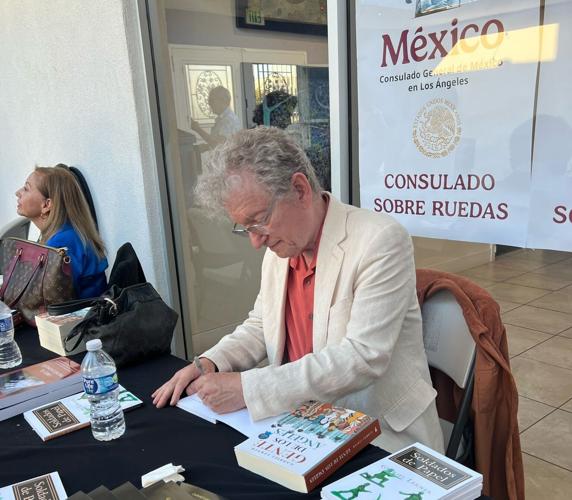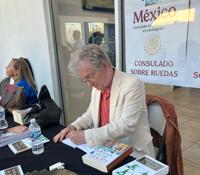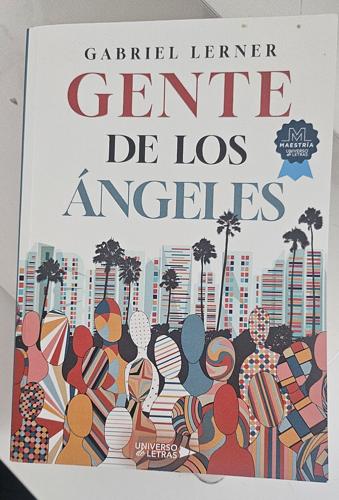
Gabriel Lerner, author of Gente de Los Ángeles. (Courtesy of G. Lerner)
Now more than ever, with the rapid advancement of technology and Artificial Intelligence (AI), it is vital for journalists to continue fighting for the truth, starting with the freedom of the press, said Gabriel Lerner, former editor of the Spanish-language newspaper La Opinión and current CALÓ News board member.
In his most recent book, “Gente de Los Ángeles” (People of Los Angeles) Lerner describes the real life, obstacles and resilience of the people living in Los Angeles. Many of his columns are based on articles written throughout the years in publications like La Opinión, the Huffington Post and HispanicLA.
Los Angeles County has a population of nearly 10 million, according to the U.S. Census. Nearly half of them identify as Hispanic or Latino and about 34% are foreign born. The county encompasses 88 cities including the largest one, the City of Los Angeles, which has a population of about 4 million and 47% of them identify as Latinos.
Lerner, who has decades of journalistic experience, said these stories now, more than ever, matter and they should be highlighted. His columns capture topics that are currently relevant like racism, economic crisis, cultural identity and the culture shock.
He said the columns, with real protagonists, are a reflection of a community in constant change, a country that goes from one crisis to another, and a society that hasn’t found its own identity yet.
24 years of storytelling
In more than 600 pages and 200 columns written from 2001 to 2025, “Gente de Los Ángeles” includes people of all origins, race and ethnicity.
From the young man who enlisted in the military and was killed in Iraq, to wage theft, poverty and homelessness, and even the identity the Lakers give to Angelenos, these columns represent everyday experiences, which organically merge with the Latino community.

Book cover of Gente de Los Ángeles. (Photo by Jacqueline García)
“In La Opinión I started publishing the weekly column called ‘Gente de Los Angeles’ and each week I would talk about a topic related to everyday life, with tribulations, the hopes and aspirations of people in general,” said Lerner.
He said it was very important to include all these anecdotes, from the migrant’s quest to the U.S., to the undocumented mothers who voted for the first time in East L.A., whose vote was for a school committee, yet for them it was historic since they had never voted before in their lives.
The book ends with the wildfires in January that destroyed thousands of properties in Los Angeles. A report by UCLA indicated that around 74,000 Latinos were affected by the fires.
While initial news reports focused on the homes that belonged to celebrities and the landmarks like the Hollywood Bowl and the TLS Chinese Theatre, the reality is that the wildfires were not just a natural disaster, but also a social disaster, said Lerner, quoting Dr. Silvia R. Gonzalez, lead investigator on the report with the Latino Policy and Politics Institute (LPPI) from UCLA. “The disasters magnify the inequality and push vulnerable communities to a worse economic situation,” Gonzalez told Lerner.
Lerner hopes that after reading the book, the reader feels proud of the trajectory of protagonists and the problems and obstacles they overcame in Los Angeles and in the country. After all, Los Angeles will continue to fight, and will continue to overcome adversity. As they always have.
Faithful to the truth
Lerner said younger journalists must continue reporting injustices, through investigation, with perseverance, ethics, and without giving up. He said now more than ever is important to overcome fake sources and information, mainly those generated through AI.
He said he tried AI once to get a story and he received it in less than a minute. However, when editing he confirmed the quotes were made up and the story wasn’t real. It was bad writing and had several grammatical errors.
“AI could be dangerous because of the bad actors who dominate our society and the federal government will use it more to lie to people,” said Lerner. “AI will never write as good as a real journalist. Real journalism is based on professionalism, good writing and finding the right sources.”












(0) comments
Welcome to the discussion.
Log In
Keep it Clean. Please avoid obscene, vulgar, lewd, racist or sexually-oriented language.
PLEASE TURN OFF YOUR CAPS LOCK.
Don't Threaten. Threats of harming another person will not be tolerated.
Be Truthful. Don't knowingly lie about anyone or anything.
Be Nice. No racism, sexism or any sort of -ism that is degrading to another person.
Be Proactive. Use the 'Report' link on each comment to let us know of abusive posts.
Share with Us. We'd love to hear eyewitness accounts, the history behind an article.